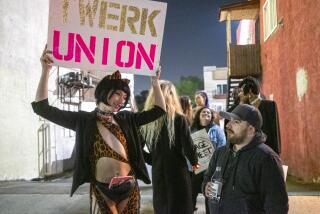Rotary’s Case for Excluding Women Goes to Supreme Court
- Share via
WASHINGTON — The U.S. Supreme Court agreed Monday to decide whether Rotary International may lift the charter of its tiny Duarte chapter for admitting three women to the male-only organization in 1977.
Rotary International is appealing a California court ruling last March reinstating the club in the San Gabriel Valley city.
One Rotary attorney said the ruling “threatens to force us to take in everyone--like a motel.”
For the justices, the case may serve to clarify a 1984 ruling in which the high court decided that the Junior Chamber of Commerce could not bar women as members because its membership was open to practically anyone and because its activities were business-oriented, not social. But the same opinion suggested that the court, under a guise of “freedom of association,” would uphold some membership restrictions by private groups whose chapters were “small and selective.”
Rotary International characterizes itself as a “highly selective” group dedicated to preserving the “freedom of intimate association” without women.
Wm. John Kennedy, a Los Angeles attorney representing Rotary International, said: “Rotary is a service organization involved in charitable work. Its members are the leaders in business and the professions, the top people only.”
Why keep out women?
“Well, the preference of Rotarians at their weekly meetings is to be with the boys,” the lawyer said. “It’s been that way for 75 years, and that’s become the accepted standard. If you have to let in outsiders, it destroys the selectivity and the prestige of the organization.”
However, Carol Agate, an attorney for the Duarte chapter, said the outsider in this case is the international body, which is fighting the action of a 21-member local organization.
“How can they talk about a ‘small, intimate group’ when they have a million members?” she asked.
Rotary International has about 20,000 clubs in 54 countries. It was founded 81 years ago by four Chicago men who took its name from their practice of rotating meeting sites to each other’s place of business.
Agate and attorneys for the American Civil Liberties Union chapter in Southern California won the ruling from a California Appeals Court, which said that Rotary’s policy of “arbitrarily” excluding women violated the state’s Unruh Act, which forbids discrimination “in all business establishments of every kind whatsoever.”
Agate said she was “surprised and disappointed” that the high court decided to hear the appeal.
“I thought they settled this issue in the Jaycees case. I can’t see much difference between the two,” she said.
The lawyer conceded, however, “that somewhere a line needs to be drawn between the right to free association in a purely social group and the right not to be discriminated against in a public organization. I just don’t think Rotary is near that line.”
The Duarte chapter was dropped by the parent group in 1978 after it admitted Mary Lou Elliott, Donna Bogart and Rosemary Frietag as members.
According to court documents, only Elliott remains a member. Frietag and Bogart moved to other communities.
The justices will hear arguments in the case--Board of Directors of Rotary International vs. Rotary Club of Duarte (86-421)--after the first of the year and is expected to render a decision by July.
The Church of Scientology won an extension from the court for its challenge of a bond requirement. Page 23.
More to Read
Sign up for Essential California
The most important California stories and recommendations in your inbox every morning.
You may occasionally receive promotional content from the Los Angeles Times.














